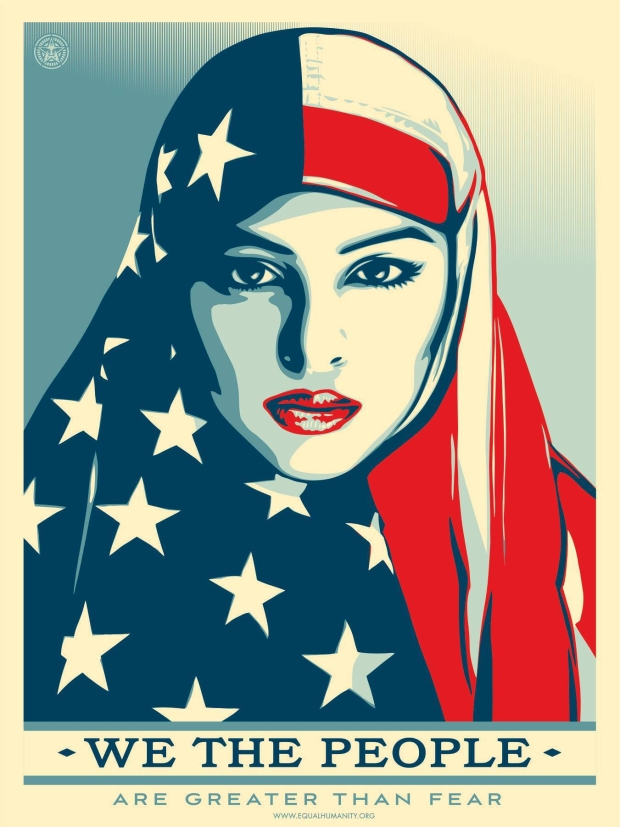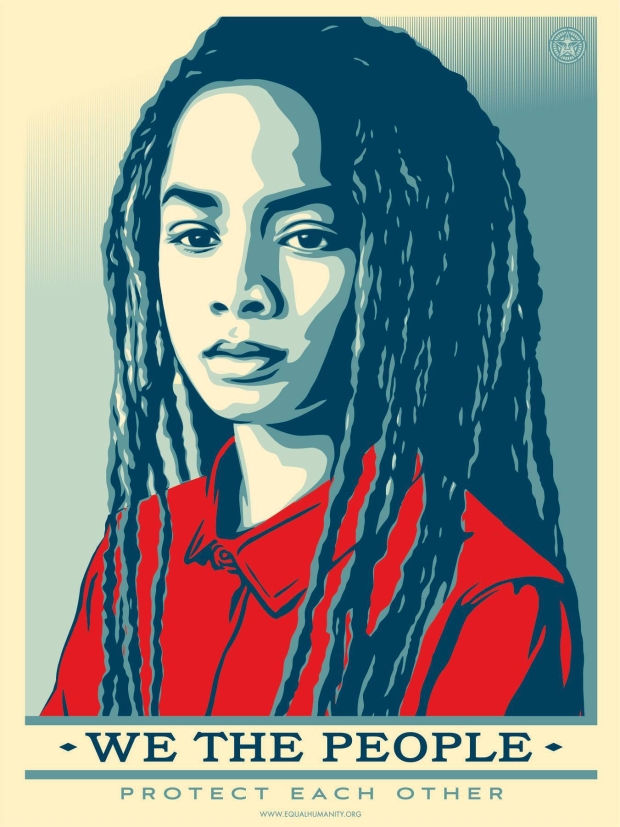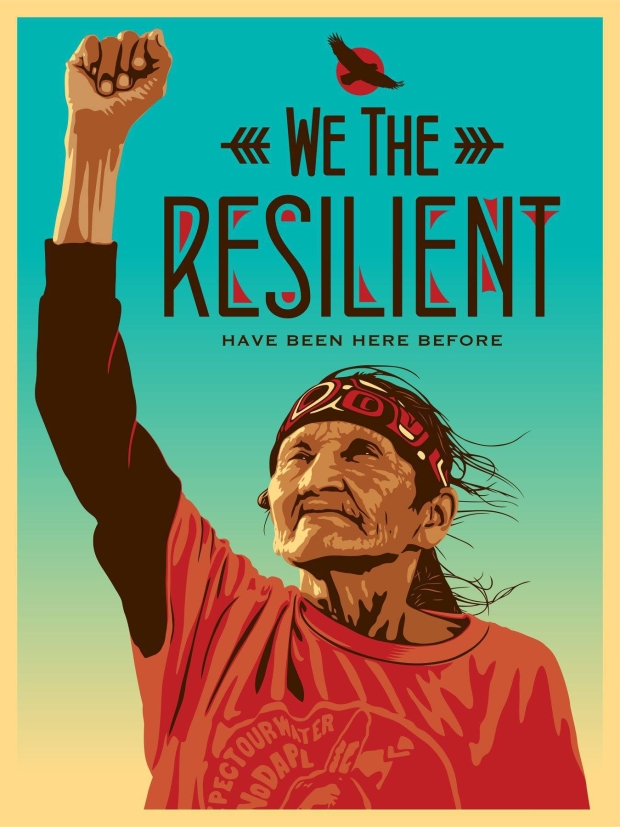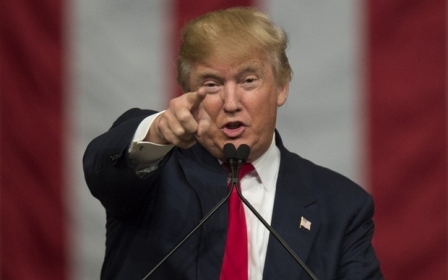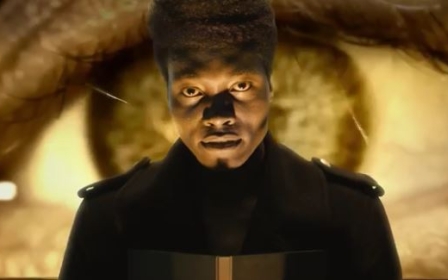Inaugural protest poster stirs debate among Muslim American women
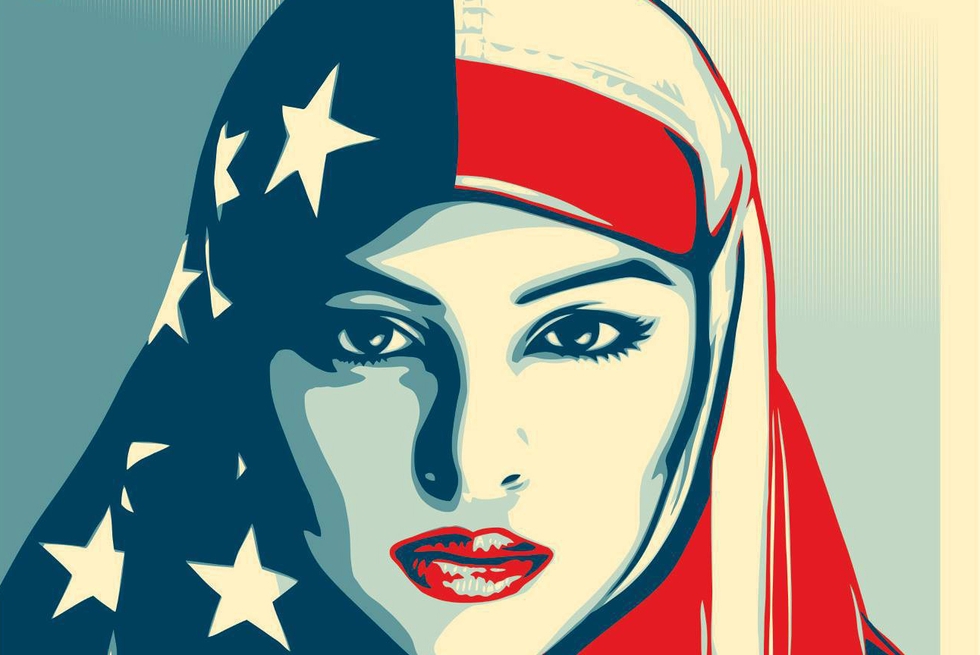
WASHINGTON DC - As supporters and protesters alike stream into Washington DC for the inauguration of Donald Trump, the hope and change that permeated the air during the Obama inaugural seems to have been replaced with shock and appal.
Over the course of the campaign, it seemed that there was no one, or no group, off limits from the then-candidate’s vitriol, and as a president-elect, Americans saw little change. In response, the artist behind the iconic image of Obama during his election has created art fitting this next occasion; not of Trump but of the people he has reviled.
Shepard Fairey created the art series “We the People,” named after the first sentence in the US constitution, attempting to capture that more perfect union with images of a black woman, a Latina, an elderly Native American man and a young Muslim woman wearing the American flag as a headscarf. The last image, based on the famous photo taken of a Muslim-American woman named Munira Ahmed by Muslim-American photographer Ridwan Adhami, has stirred controversy, and debate, even within the Muslim American community itself.
The campaign, which raised funds on Kickstarter, was the brainchild of the Amplifier Foundation, an organisation that partners with artists to promote grassroots movements. For the We the People series, the organisation partnered with artists Fairey, Ernesto Yerena and Jessica Sabogal. Fairey first became widely known for his Obama “Hope” poster from the 2008 campaign.
“When Aaron Huey and I brainstormed about this campaign, we both agreed that it was important to create images around the most attacked and excluded communities,” Fairey told Middle East Eye.
“African Americans came to mind, Latinos came to mind, but especially Muslim Americans came to mind. There are 3.3 million Muslim Americans and it is immoral to characterise a group that large as something 'other' to be feared when these Muslim Americans are our friends, neighbours and citizens.”
For some, the image of the hijab borders on the stereotypical, and does not accurately reflect the diversity of those 3.3 million Muslim Americans. For Ghazala Irshad, a journalist in New York City who covered the Arab Spring uprising, the image implies a version of nationalism that she finds disconcerting.
“I see the image of a Muslim woman wearing the American flag as a hijab as problematic,” Irshad, who will be travelling to Washington DC for the protests on Saturday, told Middle East Eye. “I believe in the freedom of choice for a woman to wear it or not wear it. But I do want the media, or an artist creating a narrative about us to recognise that we don’t all wear hijabs, and there is a diversity in this community that is being ignored.”
Irshad points to the American military’s many campaigns against Arab nations, and its treatment of Muslims in America since 9/11.
“I’m against the war, but I’m still an American. I don’t want to wave the flag around all the time, and I don’t want to have to see a Muslim woman wear a flag as a hijab to prove that we’re Muslim and American.”
For Safia Mahjebin, a young Muslim-American woman who wears a hijab, the rhetoric of the campaign, and the subsequent election, has taken a toll. She was familiar with Adhami’s original image, having seen it many times as she came of age in the years after 9/11, but seeing the Fairey art “gave me goose bumps,” she told Middle East Eye.
“And that is something I’ve never felt toward this image, even though I’ve seen it so many times. It replaced callousness and placidness with new meaning,” Mahjebin said, “Seeing it again in this new context and in new circumstances, makes me re-appreciate it.”
When asked if she was concerned that the image depicted merely one version of a Muslim woman, Mahjebin said it did, but in this context, it was appropriate.
“I think for the artist to really show and represent a Muslim woman, the most obvious is to show a Muslim woman wearing the hijab,” she said. “Because when a Muslim woman dons that piece of clothing, she’s not just practising an opinion in her faith. Wearing the hijab goes to the idea that people, whether voluntarily or involuntarily, have to don their identity on their physical bodies.”
Wearing the flag on the body is part of that, Mahjebin said. “It’s not just her wearing a headscarf, it’s her wearing a headscarf of the American flag, which is her saying, my religion is so important to me and I wear it on my head and represent it every day, but my identity as an American is also important to me, and I wear that on my head as well.”
Although women who wear the hijab are more frequent targets of racism and abuse and are far more vulnerable than Muslim women who do not wear it, Mahjebin said the image, to her, represents strength. “It’s strength despite vulnerability,” she said.
It’s that strength and power that Fairey says he had been attempting to capture with the image.
“The image of American flag hijab is very powerful because it reminds people that freedom of religion is a founding principle of the United States and that there is a history of welcoming people to the United States who have faced religious persecution in their homelands,” Fairey told MEE. “We chose the name 'We The People' for the campaign to reference the constitution and US history but also to emphasise that “WE” includes everyone. The things Donald Trump has said about monitoring and banning Muslims are in my opinion, fear mongering and totally un-American.”
The We the People campaign posters are available for free download for printing.
New MEE newsletter: Jerusalem Dispatch
Sign up to get the latest insights and analysis on Israel-Palestine, alongside Turkey Unpacked and other MEE newsletters
Middle East Eye delivers independent and unrivalled coverage and analysis of the Middle East, North Africa and beyond. To learn more about republishing this content and the associated fees, please fill out this form. More about MEE can be found here.


